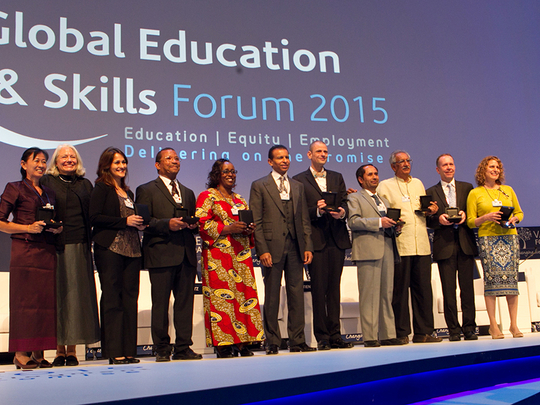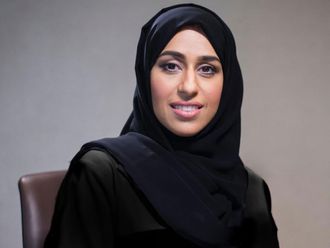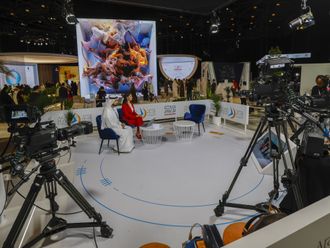
Dubai: Cambodian teacher Phalla Neang, became the first Braille teacher in the history of her country, giving blind people — who were neglected by their family and community who believed they misbehaved in a past life and deserved isolation — a chance to receive an education.
Neang is just one of the 10 exceptional teachers who were shortlisted for the $1million (Dh3,672,949.69) Global Teacher Prize, launched by Gems Education’s Varkey Foundation.
The top 10 finalists were shortlisted from 5,000 nominations, 1,300 final applications from 127 countries and 50 finalists for their truly inspirational stories.
The finalists were introduced during the Global Education and Skills Forum 2015, a two-day event organised by GEMS education with the aim of bringing together leaders from public, private and social sector of education to address the educational field’s greatest challenges.
Neang for example contributed in the opening of the first schools for blind people in Cambodia and the creation of the Khmer version of Braille.
“I started the school for the blind in 1993, back then even the ministry of education did not want it because it was believed that those born with disabilities did something bad in their past life. Even convincing parents to enrol their children was difficult,” she said at the forum.
After hard work, Neang eventually gained support, and now her blind programme, with the support from Cambodia’s ministry of education has expanded to 69 teachers and 250 children in four schools.
She proudly says that A 100 per cent of her visually impaired secondary school students passed the national examination of baccalaureate.
Azizullah Royesh from Afghanistan, another inspiring educator nominated for the prize, started his journey by opening a school at the age of 16 in Afghanistan, even though he dropped out of school at the age of 10, when his family was forced to flee the Soviet invasion.
“I was the only person in my village who knew how to read and write, so I taught some of them and within five months they were able to do so too. The government then asked me to establish schools that taught children of all ages how to read and write starting from ABC.”
Royesh tried to change perceptions of Afghan youth through education to overcome the culture of violence and hatred.
In 2009, several of his female students launched a protest against the Shiite Family law because it violated women rights, and us a result he was targeted by the Taliban.
“Extremists came to the school and said that I should be executed and the school should be burned down. I expected only a few students to come the next day but I was happy that we had 95 per cent attendance. Almost all the parents brought their children to school.”
In 2014, the school expanded to five schools and it had 4,000 students, 44 per cent of which were girls.
Another finalists, Guy Etienne from Haiti, increased the passing rate in national examination of his school from 10 per cent to 60 per cent through focusing on science. He also succeeded in and designing a TV programme about frugal science that has been rerun since 1999. He rejected the role of Ministry of education five times, he said at the forum.
The rest of the finalists include Kiran Bir Sethi from India, Jacqueline Jumbe-Kahura from Kenya, Nancie Atwell from the US, Naomi Volain from the US, Madenjit Singh from Malaysia, Richard Spencer from the UK and Stephen Ritz from the US. All of them also shared exceptional stories.
The winners will be chosen by a global academy made up of prominent individuals such as Oscar winner Kevin Spacey, Carina Wong, Deputy Director of the Bill and Melinda Gates Foundation and many more.












